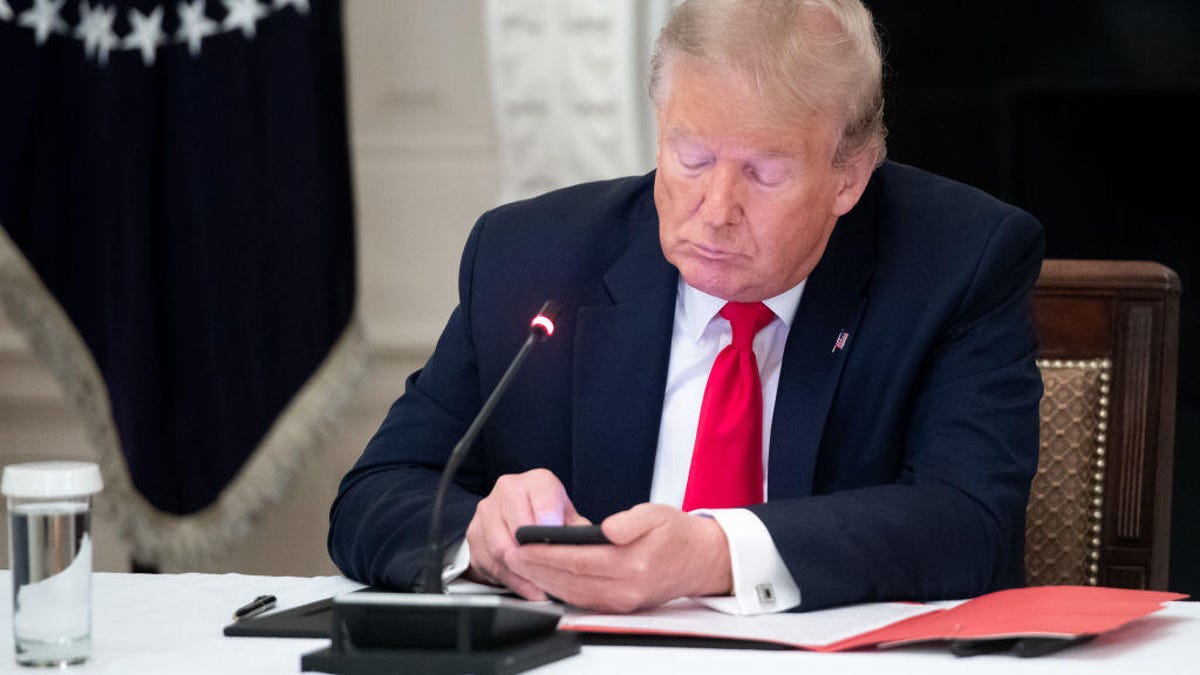Facebook and Twitter remove 'racist baby' video posted by Trump
Both companies received a copyright complaint about the edited video that included a fake CNN ticker.

President Donald Trump uses his phone during a meeting on Thursday, the same day one of his tweets was labeled for including "manipulated media."
Facebook and Twitter on Friday pulled down a misleading video posted by President Donald Trump's accounts because of a copyright complaint. The move comes after Twitter on Thursday put a label on a Trump tweet that included the same video, saying the post featured "manipulated media." The tweet is still labeled, but when you click on the video it says "This media has been disabled in response to a report by the copyright owner."
Trump's social media posts featured an edited video with a fake CNN ticker that said, "Terrified toddler runs from racist baby." The clip shows a Black toddler being pursued by a white child. After that section of the video, the clip jumps to a "What actually happened" section, which shows the two boys rushing toward each other and embracing, before the one playfully breaks away and the initial footage kicks in. The video ends by suggesting that "fake news" is to blame for the debate over racial inequality that's happening across the US.
"We received a copyright complaint from the rights holder of this video under the Digital Millennium Copyright Act and have removed the post," a Facebook spokesperson said in a statement. A Twitter spokesperson said the company also took action against the video because of a copyright complaint.
CNN reported that Jukin Media, a company that represents the parent who owns the video of the toddlers, said that they believe Trump's use of the video violated copyright.
Social media sites have typically stayed away from taking action on Trump's posts because what he says is considered newsworthy. Facebook doesn't usually send posts and ads from politicians to third-party fact-checkers. Still, social networks have other rules that even politicians aren't exempted from, such as policies about copyright, voter suppression or harmful coronavirus misinformation.
Social media companies have also faced criticism that they don't act fast enough. The edited video shared by Trump had 20 million views on Twitter and racked up more than 4 million views on Facebook before both were pulled.
CNN responded to Trump's tweet with a link to its original story about the viral video of the two toddlers hugging, noting that it covered the moment "exactly as it happened."
"We'll continue working with facts rather than tweeting fake videos that exploit innocent children," it wrote. "We invite you to do the same. Be better."
White House spokesman Judd Deere said in an e-mail that "If Twitter is not careful, it's going to have to label itself a manipulator." He didn't address Facebook's actions. Trump's campaign manager also weighed in, to tell Twitter its "days are numbered."
Read more: Trump vs. Twitter: Here's what you need to know about the free speech showdown
Last month, the president took aim at social networks with an executive order, in the wake of Twitter labeling his tweets about mail-in ballots for containing "potentially misleading information." Twitter also veiled one of Trump's tweets behind a label stating that the content violated its rules about "glorifying violence." Users can click a button in the label to go ahead and read the tweet. Facebook, on the other hand, has come under fire for not taking any action against Trump posts similar to those Twitter has labeled. On Thursday, Facebook pulled down ads by Trump's campaign for including an inverted red triangle, which is a symbol Nazis used to designate political prisoners in concentration camps.
The executive order, which is facing a lawsuit, instructs the Commerce Department to ask the Federal Communications Commission to rethink Section 230 of the Communications Decency Act from 1996, which protects online platforms from liability for content posted by users. Additionally, it gave the Federal Trade Commission responsibility for investigating complaints of political bias and determining if tech companies' content moderation policies conflict with their pledges of neutrality. For some time, Trump has claimed, without evidence, that social media companies are censoring conservative views. The companies deny this.
Correction, 11:37 a.m.: Fixes timing of Trump's executive order.



